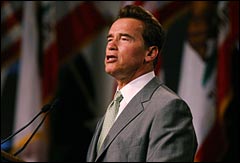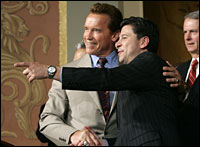He rose to fame as a cyborg warrior fighting to wipe out life on the planet. Now he’s fighting to save it. California Gov. Arnold Schwarzenegger is about to sign into law the most ambitious global-warming legislation in U.S. history — and in a twist worthy of a Hollywood blockbuster, the Republican’s support for mandatory emissions caps may actually help, not hurt, his chances of winning reelection in the upcoming California gubernatorial contest.

I’ll be back, Schwarzenegger says.
Photo: State of California
Last week, Schwarzenegger and leaders of California’s Democratic-controlled legislature struck a landmark deal on a bill that would make California the first U.S. state to mandate greenhouse-gas reductions at factories, utilities, refineries, and other industrial sites. The law will require these facilities to cut emissions to 1990 levels by 2020 — an estimated reduction of 25 percent.
The announcement threw a curveball at Schwarzenegger’s Democratic opponent, Phil Angelides, and at the California environmental groups that have been backing the Democrat.
“It’s hard to deny that this legislation will make it more difficult for voters to see a contrast between Angelides’s environmental record and the governor’s,” said Rico Mastrodonato of the California League of Conservation Voters.
But despite the climate deal, which Sierra Club California attorney Bill Magavern characterizes as “the most important global warming legislation in the country,” none of the three main green groups supporting Angelides — Sierra Club, Vote the Coast, and the California League of Conservation Voters — are expected to shift their support to the incumbent. Sierra Club and Vote the Coast have already formalized their Angelides endorsements, and CLCV is expected to do so within days.
Greens reason that Angelides has built a strong environmental record as state treasurer, and that they can trust him to pursue a more ambitious agenda in office than Schwarzenegger. “At the end of the day, we believe that stronger environmental protections for California would occur under a Gov. Angelides than under a Gov. Schwarzenegger,” said Magavern.
Some see Schwarzenegger’s support for the climate bill — which was authored by members of the state legislature, not the governor’s own team — as less than wholehearted or sincere. “The governor spent the entire summer trying to weaken the bill with various loopholes, most of which were rejected,” said Magavern, and when the legislature stood its ground, Schwarzenegger had little choice but to capitulate. A veto this close to Election Day would have made Schwarzenegger look like a hypocrite on the climate issue, and delivered a shot of adrenaline to the Angelides campaign.
One amendment proposed by Schwarzenegger would have given political appointees the authority to implement and enforce the bill, rather than the state’s Air Resources Board. The governor also tried to add a clause requiring that the emissions reductions be carried out via a market-based trading program. (The legislation, as finalized, suggests a cap-and-trade system as a possible mechanism for implementing the law, but doesn’t require one.)
Schwarzenegger also proposed an amendment that would allow the governor to delay implementation of the law for a year under “extraordinary circumstances,” including the threat of “significant economic harm” to the state. This was the only major concession that the bill’s authors, Assembly Speaker Fabian Núñez (D) and Assembly member Fran Pavley (D), made to Schwarzenegger, despite criticism from environmentalists who argued that its language is too vague and could allow the governor to stall implementation. As it is, the law is slated to go into effect this coming January, but would not actually begin reducing emissions until 2010.
Schwarzenegger’s spokesperson, Darrel Ng, maintains that the governor “is fully committed to the implementation of this bill” and sees it not only as a sound economic strategy that will help protect California’s vulnerable coastline from the impacts of climate change, but as a harbinger of worldwide change. “Gov. Schwarzenegger believes that it will establish a model for other states and nations to follow in reducing greenhouse-gas emissions,” Ng told Muckraker.
A Bitter Phil
Bob Mulholland, a senior campaign adviser for the California Democratic Party, insists that Angelides won’t weaken his emphasis on green issues in the wake of the governor’s high-profile climate agreement. “Schwarzenegger knows very well that bullshit goes a long way, and that’s what this is about,” he said. “It’s largely a political ploy, and my bet is that if he gets reelected he’s going to promptly roll back his emphasis on strong environmental protections.”
Mulholland also contends that the climate bill could prompt a backlash among Republican voters. It’s one of several deals Schwarzenegger has been making with Democrats in order to appeal to moderate voters; others aim to increase the minimum wage, offer cheaper prescription drugs, and start up clean-needle programs. “Republicans aren’t happy,” said Mulholland. “We believe it could cost him up to 100,000 votes.”
The moderate voters to whom Schwarzenegger is appealing are now more than ever inclined to vote Democrat, Mulholland argues. “This is going to be a Democratic year across America. If Republicans were doing well — if Iraq wasn’t such a mess, if interest rates and gas prices and the deficit weren’t soaring — it would be very hard for Dems to beat incumbents. But voters are angry. They’re angry at George Bush and many aren’t going to support Schwarzenegger on principle because he’s a Republican.”
The polls, however, indicate that Schwarzenegger may be bucking the national anti-GOP trend. In July, the two candidates were running neck-and-neck. But a recent survey of likely voters by the Public Policy Institute of California showed Schwarzenegger up by 13 points, with 45 percent support compared to 32 percent for Angelides.

Schwarzenegger and Núñez, palling around.
Photo: AP/Rich Pedroncelli
Schwarzenegger’s standing has probably been given a boost by friendly relations with leading Democrats in the state — much to Angelides’s chagrin. Assembly Speaker Núñez, cosponsor of the climate-change bill, recently waxed affectionate when he introduced the governor at a political reception: “California is once again, my friends, on the move, thanks largely to this man, the governor of our great state and a good friend of mine, Gov. Arnold Schwarzenegger.”
California has long been a leading indicator for U.S. environmental politics. When a threatened Republican incumbent in the state turns to mandatory global-warming regulations to fend off a challenge, you know the times they are a-changin’.

